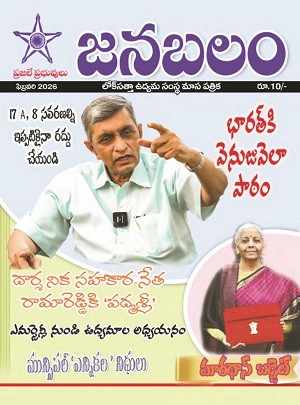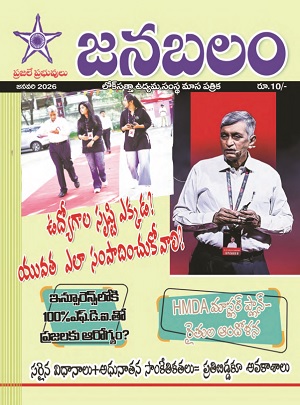29th August 2009
Sri Seetarama Murthy
Advocate-General of AP
Hyderabad
Dear Sri Seetarama Murthy garu,
Kindly find enclosed my letter to the Speaker requesting him to invite you under Article 177 of the Constitution to guide the AP Legislative Assembly whenever the Bill to amend the Andhra Pradesh Societies Registration Act 2001, is taken up for consideration by the House. I am also enclosing the Bill for your information. The Bill provides for supersession of the (managing) committee of any society which is “not functioning properly or willfully disobeys or fails to comply with any lawful order or direction issued by the Registrar”, and appointment of a special officer or a committee to manage the affairs of the society up to three years,
I have formally objected to introduction of the Bill under Rule 96 (2) of the Assembly Rules, on the ground that such a law violates Article 19(1)(C) read with Articles 19(4) and 13(2). Under Article 19(4), the societies or unions can be regulated by a law imposing reasonable restrictions only in the interests of sovereignty and integrity of India, public order or morality. I have objected the introduction of the Bill as the restrictions sought to be imposed do not pertain to sovereignty and integrity of India, or public order or morality. The Minister concerned countered my objection on the ground that Article 19(5) provides for restrictions ‘in the interests of the general public’. I pointed out that Article 19(5) applies only to the rights conferred under Article 19(1)(d) and (e), and not to Article 19(1)(c). However, the Bill was introduced in the AP Legislative Assembly on 28th August 2009.
When there is a vital Constitutional question of this magnitude relating to the Fundamental Rights and the legislative competence of the House, we need the guidance of a Constitutional expert. Article 177 of the Constitution addresses such a situation. According to Article 177, “The Advocate-General for a State shall have the right to speak in, and otherwise take part in the proceedings of, the Legislative Assembly of the State,. … but shall not be entitled to vote”. This is a case in which your guidance and Constitutional expertise will be of great value to the House while considering this important legislation.
I have written to the Speaker of the Legislative Assembly to invite you to the House whenever the Bill comes up for consideration, so that the House can benefit from your expertise (Letter enclosed). As per the Article 177, the Advocate-General has the right to participate in the House proceedings at any time. I, therefore, request you to kindly make it convenient to participate in the proceedings of the Assembly when the Bill comes up for consideration.
In view of the importance of this issue, I am sharing this communication with the Speaker, all Floor Leaders, concerned Ministers, and the general public.
With warm personal regards,
Jayaprakash Narayan
Saturday, August 29, 2009
Dr.JP's Letter to Advocate General of AP
Subscribe to:
Post Comments (Atom)





Dear Sir,
ReplyDeleteIf the said amendment is against constitutional spirit how Karnataka Government has brought out an amendment to the Karnataka Societies Registration Act, 1975, Section 27A which was inserted in the year, 1986 for the appointment of an Administrator? Is it not there functional for all the years? For more than 33 years none questioned the constitutionality of this Act and Section. Similarly when A.P. Government wants to introduce such amendments in its existing Societies Act, why all this hue and cry?
It is well to the knowledge of the people, many a number of the MLAs and MPs are associated with these "non-profitable" societies and are misusing the spirit of Constitutional freedom. Is it not good, atleast now, to bring this amendment to curb such unwanted things in the societies?
Think again Sir...
Revathi
@revathi,
ReplyDeleteThe question is of independence of private societies from Govt interference. There are already existing laws to deal with cheating/fraud. Govt has no right to takeover whatever society it does not feel comfortable with. The 'unwanted things' are already covered under constitution: "the societies or unions can be regulated by a law imposing reasonable restrictions only in the interests of sovereignty and integrity of India, public order or morality"
@jujung
ReplyDeleteYou have not mentioned whether the Sections 27 and 27A of Karnataka Societies Registration Act were against the constitutional spirit. It is, in my view, with reasonable restrictions, which all of us should at least have for public order and morality.
The law should be for the sake of public and not for few or in majority cases of Societies it is mere for individuals you can count on numbers. We all know well that there is no appropriate law for guiding the Societies, like in the case of Companies for which we do have a strong Companies Act and other allied laws. In the shadow of present Societies Act quite a number of the big registered societies are going for commercial activities. None questions them.
It is not just for the present cricket board case. Almost all the Societies, leaving small welfare societies, are in the hands of those big guys who use them for their individual profit and promotion. Societies have become individual properties of their owners. Who regulates them?
It is a well known fact of the opposers to this amendment is supporting their own version; it is against constitutional rights. This is their argument. A policeman is needed to control the traffic even though we do all know well that there are punishments for the violation of traffic rules. How many of us are ready to follow the strict traffic rules if there is no policeman?
I again request you to think...let the debate continue...
Revathi
@revathi,
ReplyDeleteIf somebody misuses public money, there are many laws by which government can take action, irrespective of the type of organization (private, public, society or anything). Do you know any case, where it cannot be solved by the present laws, and this law is required to save public/society money?
@revathi
ReplyDeleteWhatever the govt intentions but one has to understand that they run under the control of Constitution of India, if at all it is preventing them to serve the people then they should first get the amendment done and proceed from there on. Instead getting the bill done and worry only if someone goes to the court, shouldn't be the attitude of the govt.
I read the section 19 of the constitution just now and it clearly mentions what JP is talking about. The govt is just taking it as a pride to step back but there is absolutely no scope for argument.
Coming to the act itself, will this new act is going to solve the issues created by the societies ? I doubt it. We all know how the govt controlled registrar offices run and how much of under table activities happen. Making this law would increase those activites, whoever is doing some illegal activities will sure bribe enough to get escape. I believe the proper way would be go through the courts, if at all our courts are too much of time making things more complicted. They are the issues which need to be resolved first. But I agree this is debatable..whereas what is said in constitution is clearly mentioned and no scope for the debate.